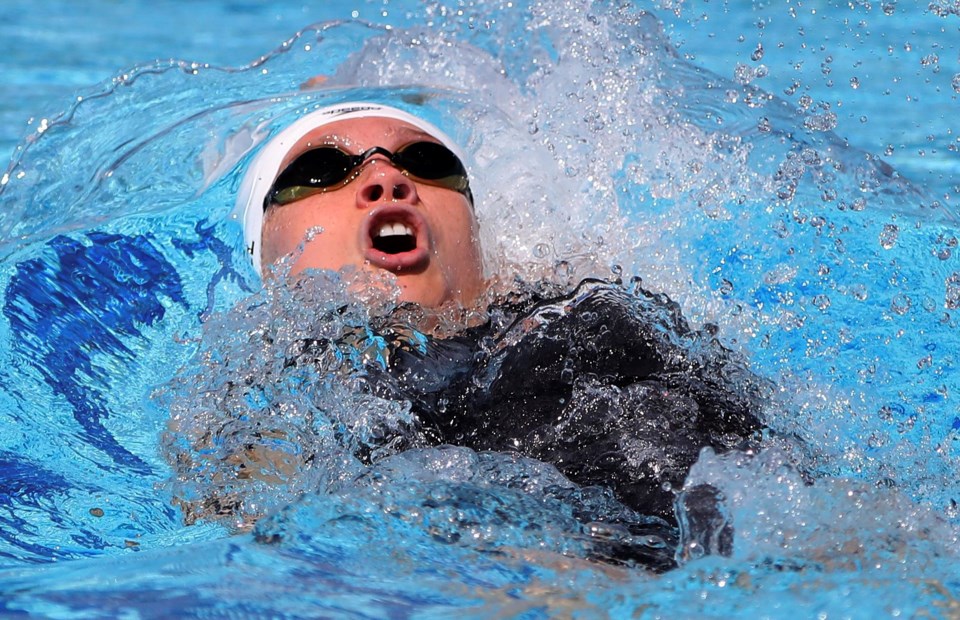The passing-of-the-torch metaphor is probably the most over-used in sports. That’s because the new superseding the old is inevitable on any team and in any organization.
The story was told once again Sunday in Gold Coast, Australia, at the 2018 Commonwealth Games. The Claremont Secondary-graduate and emerging pool star Sarah Darcel won silver in the women’s 200-metre IM. Her veteran clubmate from Saanich Commonwealth Place, 2016 Rio Olympics bronze-medallist Hilary Caldwell, faded to fifth place in the women’s 200-metre backstroke in what will likely be her final race.
“I didn’t have quite the performance I wanted at the worlds last year,” said Caldwell.
“I was feeling mentally tapped out. [So] I really wanted to come down here and be in the Games environment. It’s a cool way to end.”
> More Games coverage at timescolonist.com/sports/commonwealth-games
Canadians Kylie Masse (2:05.98) of Windsor, Ont., and Taylor Ruck (2:06.42), a Canadian raised in Phoenix, won gold and silver in the 200-metre backstroke with Emily Seebohm of Australia (2:06.82) third and Caldwell fifth in 2:09.22. Masse also won gold in the 100-metre backstroke, while it was the seventh medal of the Games for the 17-year-old sensation Ruck, who trains at the High Performance Centre-Ontario.
Darcel, a freshman swimmer in the NCAA Pac-12 with the Cal-Berkeley Bears, was a saucer-eyed newcomer when she joined the Swimming Canada High Performance Training Centre at Saanich Commonwealth Place, where Caldwell was the established women’s performer, and the retired two-time Olympic-medallist Ryan Cochrane the men’s star. Now it is Darcel who is establishing herself as someone to watch on the road to the 2020 Tokyo Summer Olympics as she swept to the 200-IM podium in 2:11.14 behind winner Siobhan Marie O’Connor (2:09.80) of England. Erika Seltenreich-Hodgson of the High Performance Centre-Vancouver won bronze in 2:11.74.
Darcel pinpointed the portion of the 200 IM she thought she won her silver medal: “The breaststroke was the key for me. It was a great race.”
The likes of Masse, Ruck and Darcel have people predicting big things for Canadian swimming, especially on the women’s side, for Tokyo 2020.
“It’s crazy to feel old at 27, but it’s nice to see how the young talent is coming up,” said Caldwell.
“It reminds me of the Victoria group we had six to seven years ago. I like this young team, and this [Commonwealths] is a good first-Games experience for several of them, on the way to the Tokyo Olympics.”
The new wave includes Faith Knelson of Ladysmith, who trains in Saanich at the centre with Darcel, and who was fourth Monday in Gold Coast in the women’s 100-metre breaststroke final.
Jade Hannah, yet another of the young group out of Saanich Commonwealth Place, advanced to the final of the women’s 50-metre backstroke.
St. Michaels University School-graduate Jeremy Bagshaw of Victoria, studying at UVic to become a doctor after an NCAA Pac-12 medal-winning swim career at Cal-Berkeley, just missed the Commonwealth Games podium Sunday with a fourth-place finish on the Canadian men’s 4x200 freestyle relay team. The medallists were Australia, England and Scotland.
Bagshaw swam the opening leg for Canada.
“I want to give my teammates as good a start as I can,” he said, before the race.
“I want to swim best times and see how it goes towards Tokyo 2020. Multi-sport Games such as these are good preparation for the Olympics.”
There are 283 Canadian athletes competing in Gold Coast, of which 52 are from the Island or who live and train full-time in Greater Victoria. The latter have three medals so far through Darcel’s silver in swimming and Joanna Brown’s bronze in triathlon and Jay Lamoureux’s bronze in cycling. Knelson, Bagshaw and the Victoria-based triathlon mixed relay team have placed fourth.
Canada was third in total medals with 37 behind Australia's 106 and England's 63 following competition Monday. But in terms of gold medals, which is the international ranking system, Canada was sixth with seven golds behind Australia's 39, England's 22, India's 10 and New Zealand's and South Africa's eight each.



